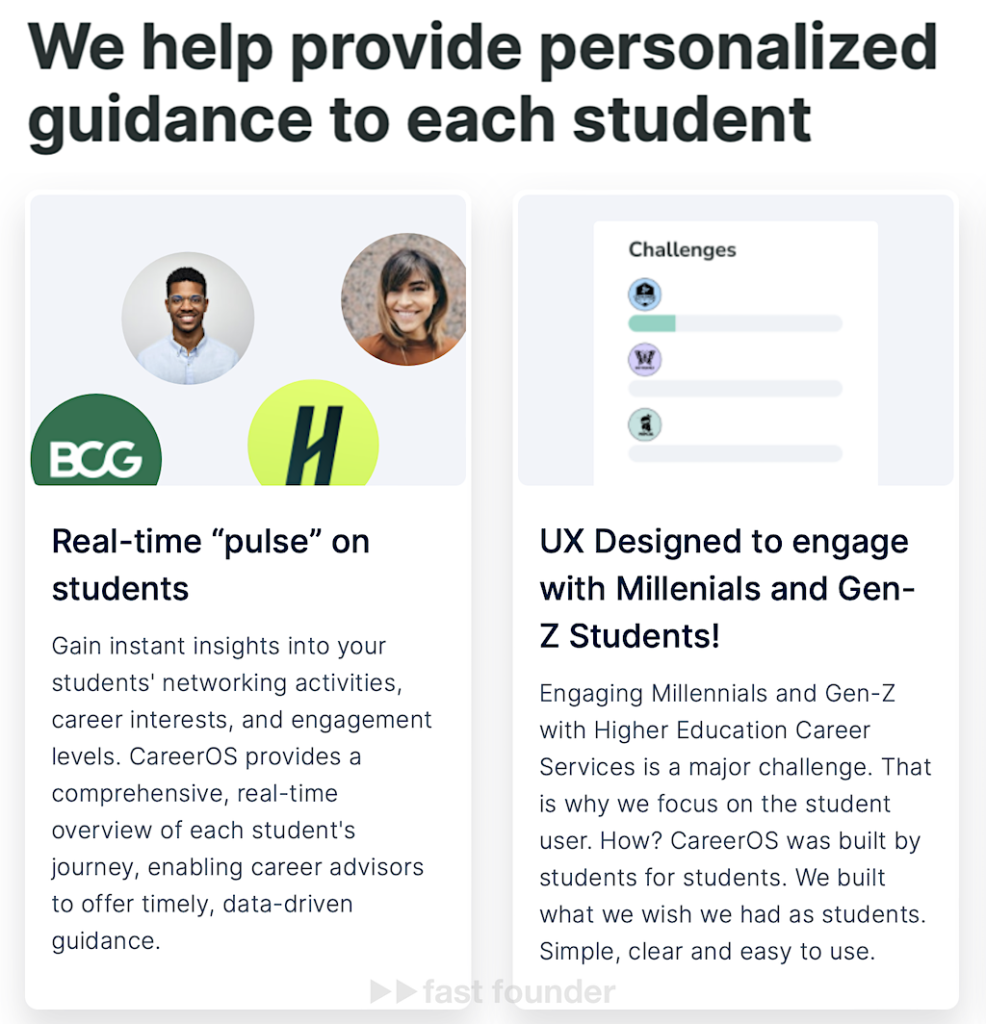- Most startups targeting the vast online education market try to improve the learning process. Although the ultimate goal of almost any education is employment 😉 So, we should not just help students learn and study – but also search for and find jobs!
- This is needed not only by students but also by course creators, who can attract new students with successful job placements of graduates. So, course creators will be willing to pay for such platforms.
- It seems like there’s an opportunity here that most startups aren’t capitalizing on yet! But you can seize it by creating your own version of such a platform:
Project Essence

CareerOS is a platform that helps university students more effectively search for and find jobs they can land after graduation.

The platform’s effectiveness is driven by three reasons:
- Each student receives personalized recommendations from the platform to help them land a job tailored to their specialization, academic performance, and preferences.
- University administration can see how actively students engage in platform actions that could lead to job opportunities, allowing them to intervene timely and encourage those who aren’t taking it seriously enough.
- The platform interface is intentionally designed to align with the habits of millennials and Generation Z, making students more engaged in the necessary job-seeking activities.

Job hunting on the platform is presented as a game – a set of “quests” that students must complete, earning points along the way.

Every week, students must accumulate a certain number of points. Points are awarded for a) saving cards of potential employers on the platform, b) making new contacts with industry hiring managers and experts, and c) sending messages to maintain these contacts.
There is a default number of points that students must accumulate each week. However, the most active students can set their own goals to regularly strive to achieve them.
The platform calculates students’ accumulated points in real-time and displays the current ranking, adding a sense of competitiveness to the otherwise mundane job search process.

Students’ communication with hiring managers and experts is structured like a social network. They see a feed of events and messages they can comment on, and they can subscribe to interesting new contacts from this feed.

The platform’s key feature is sending students notifications and reminders – “a message from an employer has appeared in the feed that might be of interest to you”, “you’ve received a new message or comment”, “you’re losing positions in the ranking”, and so on.

Aside from gamification, the platform houses a serious AI engine that builds an individual job search plan for each student, suggests the most suitable job opportunities, and helps draft letters to potential employers.

The startup was founded in 2023 – but has already gained university clients not only from its native Spain but also from the USA, France, and Germany.

Currently, CareerOS has raised its first investment round of $1.2 million.
What’s Interesting
The most successful startups are those that help their users achieve ultimate goals, rather than just adding simplicity, convenience, and other bells and whistles to some process.
Interestingly enough, the ultimate goal of education in university for students is finding a decent job. For the university itself, it’s essentially the same. Because the more graduates successfully land jobs, the more new students it can attract, flaunting employment rates rather than abstract teaching quality.
That’s why CareerOS is a very useful platform, as it helps both students and universities achieve their ultimate goals. This sets their platform apart from many other educational institution platforms, which strive to add efficiency, simplicity, and convenience only to the educational process.

However, CareerOS claims that they “help the best students find their dream job.” But that’s complete nonsense 😉 After all, the “best” students are capable of finding a job on their own – because they will actively pursue it without any reminders or encouragement.
The main problem for any university is the “poor” students who are not actively searching for employment. And, unless we’re talking about a few top universities, unfortunately, most students fall into this category ☹️
So, these students need constant monitoring and encouragement to do something about it. But constant monitoring and encouragement mean time and, consequently, money that the university must spend on it. And CareerOS helps them save this time, providing an acceptable level of job search efficiency for a larger number of students.

Siro, a startup I wrote about last fall, operates on the same principle. They’ve created an AI coach for the sales department, which, as the startup claims, helps salespeople sell more. But the real trick of the startup lies elsewhere.

The essence is that sales volumes among employees in most sales departments are distributed exponentially – a larger percentage of salespeople sell little, and only a small percentage sell a lot. In other words, the main contribution to the overall sales of the department is made by the “stars,” whom sales department managers spend their time training to sell even more.
However, many of those who are currently selling poorly can be helped to improve their results – if time is spent on it. But no living manager wants to deal with such salespeople, so this task can be taken on by an AI trainer.

The goal is to turn the sales distribution curve within the department from a decreasing exponential into a “saddle,” where most salespeople start selling at least moderately well, thereby significantly improving the overall departmental results.
In general, this is a very important point related to the use of AI to increase the efficiency of company operations – which I wrote about not long ago on the Dark Side.
- Who would you start teaching to use AI in your company first – smart employees or fools? Probably smart ones, so that these valuable staff work even better. And you’ll be wrong for two reasons.
- Firstly, a recent study showed that good employees improve their results with the help of AI by only 17%, while all others improve by 43%. As a result, the difference in efficiency between good and poor employees decreases from 22% to almost imperceptible 4%.
- Thus, the return on investment in training AI for bad employees is several times higher than for good ones! So where is it better to invest your time and money? Moreover, good employees will surely learn to use AI themselves – so why spend money on it yourself?
- Secondly, to scale a business, you usually need to hire many new employees. You can’t hire many good employees simply because there are none to hire. This means that scaling will have to be done with poor employees. How to increase the efficiency of their work? Teach them to use AI.
- But for this, you already need to know how to teach bad employees to use AI. And teaching fools is not so easy. The sooner you start doing this, the sooner you will learn. And you will calmly pick out all the necessary AI tools for them.
- Well, who will you start teaching to use AI in your company or startup tomorrow?
Where to Run
The first conclusion is general and applicable to startups from any field that have decided to implement AI into their platforms. Its essence is that AI platforms should primarily be made for “fools” who are not doing well at what they do 😉
After all, AI can spend endless amounts of time explaining, training, or even doing things for them – resulting in them being able to achieve acceptable quality results. And this will be a very sharp leap for them – for which they or their companies will be willing to pay.
So the question is – what are many people doing poorly right now? Can they start doing it better if they start helping them many times more? Can AI take on this task? What should it know for this? What should it do for this?
The second conclusion is regarding the application area of the same concept as today’s CareerOS.
This startup decided to implement its platform in universities. But there are a huge number of online professional training courses whose ultimate goal is to successfully employ as many of their students as possible, advertise this fact, and attract as many new ones as possible.
The low employment rate after such courses is usually explained not even by the quality of education, but by the fact that students do not search for a job during their training effectively enough or even completely neglect it. And controlling, motivating, and helping each student is too much of a hassle for teachers.
Accordingly, you can create a similar CareerOS platform and sell it to the creators of online courses interested in employing their graduates. However, to do this, two things should be added to the platform:
A set of educational materials on job search – how to make contacts with potential employers, how to communicate with them, how to write a resume, how to prepare for and conduct interviews, and so on. To take on the centralized recruitment of potential employers who may be interested in accessing graduates from a variety of online courses at once. After all, most companies are currently experiencing a shortage of qualified employees – and to hire anyone, they need to have a wide candidate funnel.
The beauty of it is that most startups targeting the education market try to improve the learning process – not the process of achieving the end result, which is employment. So, you have a chance to stand out from them 😉
About the Company
CareerOS
Website: thecareeros.com
Last round: $1.2M, 16.02.2023
Total investments: $1.2M, rounds: 1
